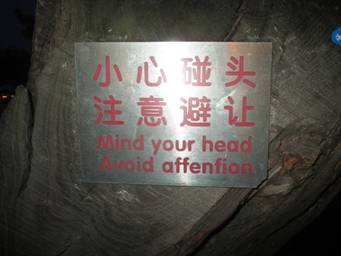Avoid affenfion
« previous post | next post »
Sign on a tree in Qingdao, Shandong, sent in by Dean Barrett:

xiǎoxīn pèngtóu 小心碰头 ("be careful [not to] hit your head")
zhùyì bìràng 注意避让 ("pay attention to avoid")
We've seen xiǎoxīn pèngtóu 小心碰头 ("be careful [not to] hit your head") translated in many different ways. For a list of nearly two dozen Chinglish variants, see:
- "Mind your head" (8/28/15)
But I don't think we've ever seen it used in combination with zhùyì bìràng 注意避让 ("pay attention to avoid"), even though the latter shows up in many locations scattered across China, usually in connection with traffic conditions.
Lai Ka Yau said,
June 30, 2017 @ 1:17 am
As someone from Hong Kong, I find 注意避让 to be somewhat strange. When I say 注意XX, I'd usually mean 'be careful when you XX', not 'make sure to XX', e.g. 注意飲食 means 'pay attention to what you're eating and drinking'. Though I'm not sure if I'm finding it odd because of this syntactic oddity, or because the word 避让 isn't very familiar to me, or a combination of the two.
richardelguru said,
June 30, 2017 @ 12:11 pm
Are they using 'f's as long 's'es???
Pittsburgh Vince said,
June 30, 2017 @ 1:34 pm
No, they're using 'f's as short 't's!
John Swindle said,
July 1, 2017 @ 1:49 am
The problem with the English, apart from the orthography, is that "avoid attention" doesn't mean the same thing as "pay attention to avoid." Google Translate, given the two lines of Chinese, returns "watch your head/Pay attention to avoid." That's better, but a little ambiguous; if you ask it to re-translate that to Chinese, it says "看看你的头/注意避免", which in turn it correctly re-translates as "Look at your head/Pay attention to avoid".
Jonathan Smith said,
July 1, 2017 @ 6:12 pm
Not convinced "pay attention to avoid" is a coherent English message… this is a "take care to yield/share right of way"-type situation, correct? But what John Swindle said; the wild misinterpretation of the syntax is pretty interesting…
Victor Mair said,
July 1, 2017 @ 6:23 pm
Yes, "avoid [oncoming traffic — probably foot traffic in this case] and make way", which is how I originally translated it, but that became too prolix, so I shortened it as in the o.p.
John Swindle said,
July 2, 2017 @ 3:52 am
Jonathan Smith, Victor Mair, thank you. I forgot the "make way," which was just wrong (让)on my part.
Terrence G. said,
July 2, 2017 @ 8:42 pm
Maybe it should be translated as "pay attention AND avoid", since there is no logical connector between the two words in the original Chinese phrase. The actual structure can be either VO or just VV.
Also it looks like it is a covfefe moment here. Someone was having some fun. lol.